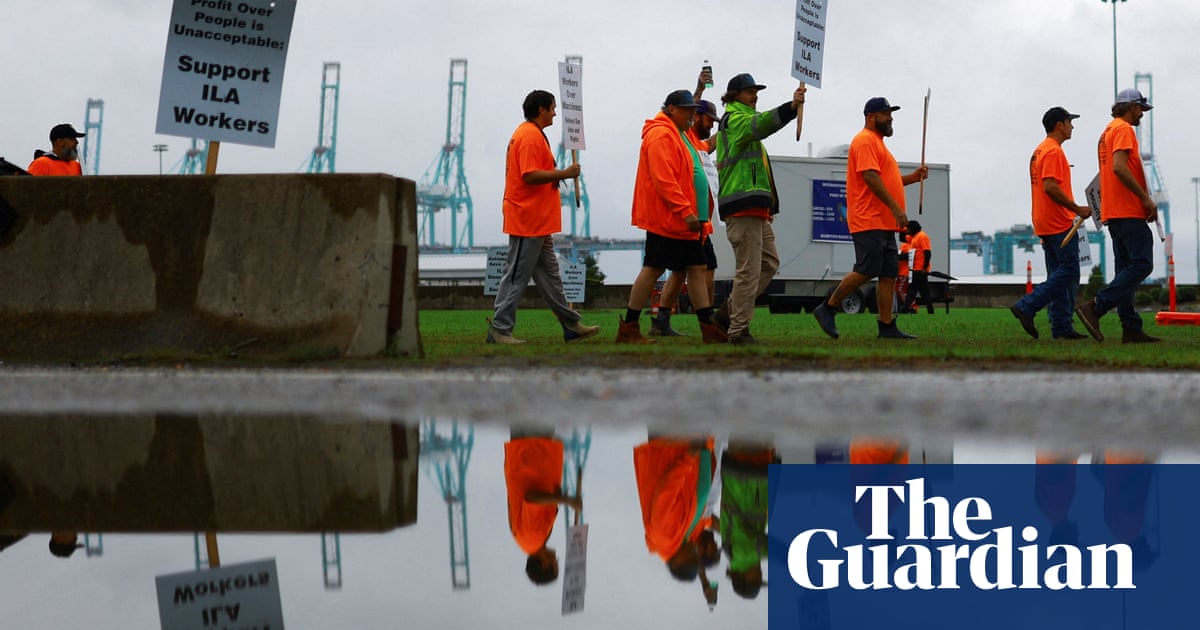Donald Trump unleashed a foul-mouthed tirade about undocumented immigrants and predicted that this âcould be the last election we ever haveâ if Kamala Harris wins during a private fundraising dinner this summer.
The Guardian obtained a 12-minute recording of a speech that the Republican presidential nominee gave at a dinner on 10 August in Aspen, Colorado, where attendees were required to donate anywhere from $25,000 to $500,000 a couple.
Trump devoted most of his address to border security and immigration, recycling xenophobic claims now familiar from his rallies. âRadical leftwing lunaticsâ want people to come in from prisons, mental institutions and insane asylums, he asserted without evidence, adding that the US was harbouring âa record number of terroristsâ.
The former president insisted that âsmart, very streetwiseâ leaders of Venezuela and other South American countries were sending murderers and drug dealers to the US to reduce their own crime rates, relieve the burden on their prisons and save money.
Trump cited a false example of 22 people he claimed had come to the US after being released from prison in the Democratic Republic of the Congo. âWe said, âWhere do you come from?â They said, âPrisonâ. âWhat did you do?â âNone of your fucking business what we did.â You know why? Because theyâre murderers.â
The candidate added, âI hate to use that foul languageâ, apparently recognising that his use of the F-word went further than his campaign rallies. The Congolese government has said there is no truth to Trumpâs statements.
The candidate went on: âThese are the toughest people. These people are coming in from Africa, from the Middle East. Theyâre coming in from all parts of Asia, the bad parts, the parts where theyâre rough, and the only thing good is they make our criminals look extremely nice. They make our Hellâs Angels look like the nicest people on earth.â
Studies show that immigrants are less likely to commit crime than native-born Americans.
Trump flew to Aspen on a Gulfstream G-550 jet once owned by Jeffrey Epstein, the late disgraced financier and convicted sex offender, after his own private plane â a Boeing 757 known colloquially as Trump Force One â encountered engine trouble.
The dinner was held at the $38m home of the investors and art collectors John and Amy Phelan. Guests included the casino mogul Steve Wynn, billionaire businessman Thomas Peterffy, Texas governor Greg Abbott, Florida congressman Byron Donalds, Colorado congresswoman Lauren Boebert and former Colorado senator Cory Gardner.
Trump, who instigated an attempted coup on 6 January 2021 and has claimed that his Democratic rival Harris poses the true threat to democracy, used the exclusive event to warn of dire consequences if she becomes president.
âLook, we gotta win and if we donât win this countryâs going to hell,â he said. âYou know, thereâs an expression, this could be the last election we ever have and itâs an expression that I really believe, and I believe that this could be the last election we ever have.â
The ex-president was speaking a month before his first and probably only televised debate against Harris, of which opinion polls and pundits would widely judge her to be the clear winner. That was not what he predicted.
âIâm telling you we have a radical left person thatâs going be president â if she wins itâs going to be a disaster â she wants to be president very badly. Thank God sheâs supposed to be horrible at debating, although sheâs nasty, and sheâs supposed to be really bad at interviews. She canât do an interview.â
after newsletter promotion
Trump also claimed that Harris supports the âdefund the policeâ movement, suggesting that she was a typical politician who will revert to type once she is elected.
âHer policy is defund the police. She wants to defund the police. She wants open borders. With a politician â and Iâve seen it because Iâve been on both sides of politics for a long time; now, a short time for this side but I was always a contributor â she wants to go out and she wants to defund the police. And they always go back to their original plot. They always do.â
Harris, a former courtroom prosecutor, did voice support for the âdefund the policeâ movement in a radio interview in June 2020 but later reversed her position after becoming Joe Bidenâs running mate.
Trump also reflected on surviving an assassination attempt at a July rally in Butler, Pennsylvania, where 20-year-old Thomas Crooks opened fire from a rooftop, killing firefighter Corey Comperatore, 50, and injuring two other Trump supporters.
Trump told how members of his Florida golf club, Mar-a-Lago, asked to make a contribution to Comperatoreâs family. âI said absolutely and they gave me a cheque for a million dollars. Thatâs a lot of money. Maybe even more impressively we put out a GoFundMe and we raised more than $6m for the group that got hurt, which is essentially three people.â
Then, recalling a meeting with Comperatoreâs widow, Helen, he made a risky attempt to find humour in the tragedy. âSo theyâre going to get millions of dollars but the woman, the wife, this beautiful woman, I handed her the cheque â we handed her the cheque â and she said, âThis is so nice, and I appreciate it, but Iâd much rather have my husband.â Now, I know some of the women in this room wouldnât say the same.â
As dinner guests erupted in laughter, Trump quipped: âI know at least four couples. There are four couples, Governor [Abbott], that I know and youâre not one of them. At least four couples here would have been thrilled, actually.â
The event is understood to have raised $12m for Trumpâs campaign but was not enough to prevent Harris raising more than four times as much as her opponent in August, the first full month of her bid for the White House.









